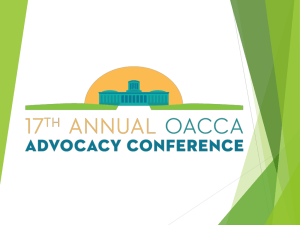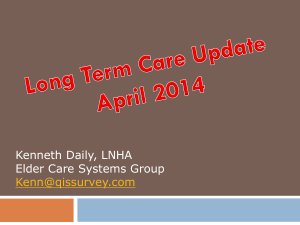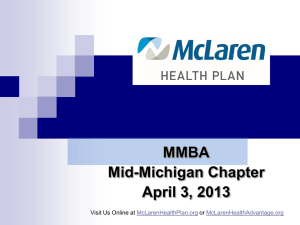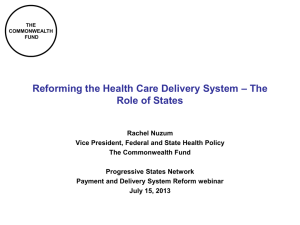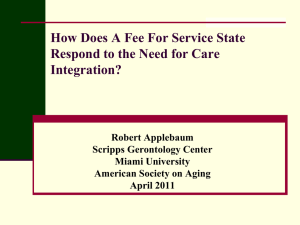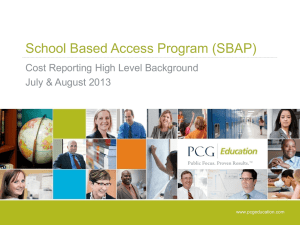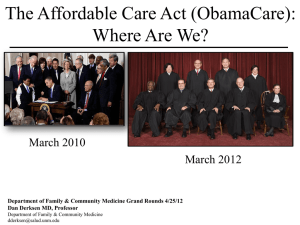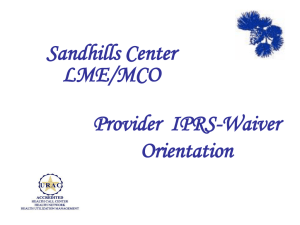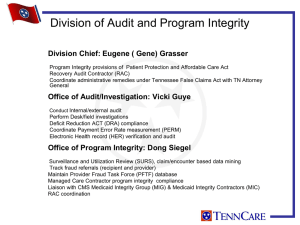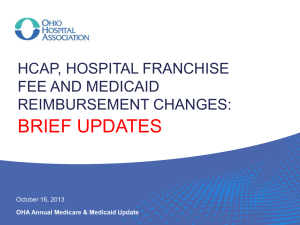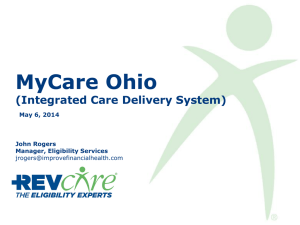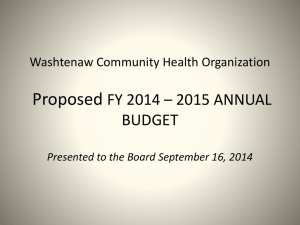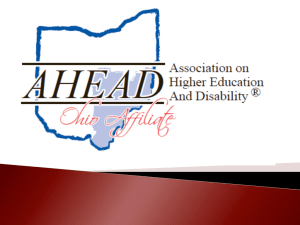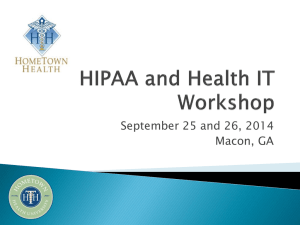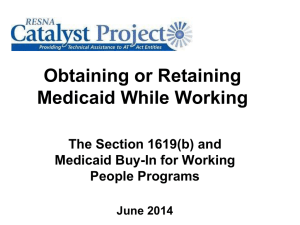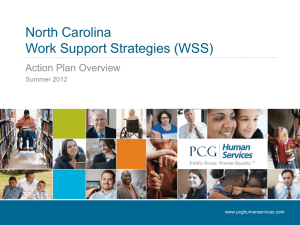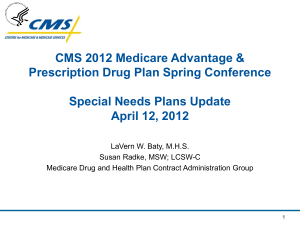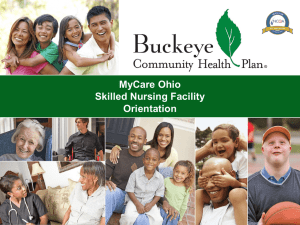View this presentation. - National Association of State Mental Health
advertisement
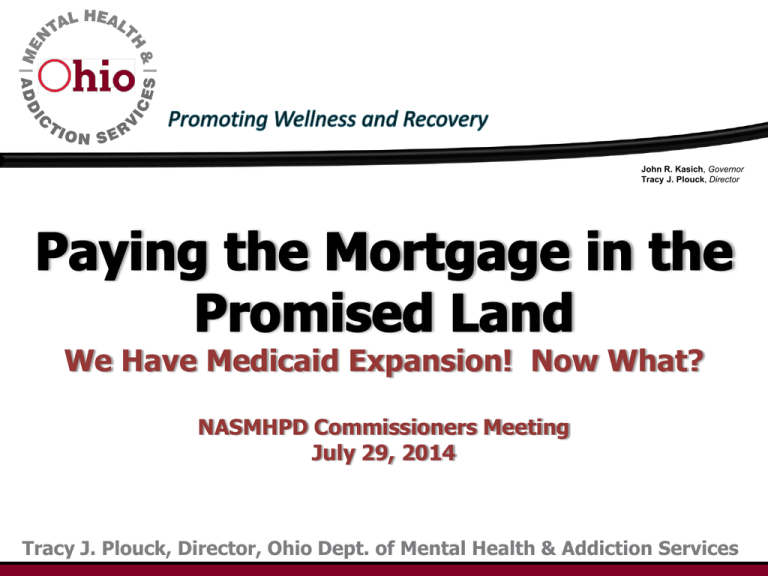
John R. Kasich, Governor Tracy J. Plouck, Director We Have Medicaid Expansion! Now What? NASMHPD Commissioners Meeting July 29, 2014 Tracy J. Plouck, Director, Ohio Dept. of Mental Health & Addiction Services 1. Ohio’s behavioral health system background 2. Ohio’s Medicaid expansion story 3. What does Medicaid expansion mean for OhioMHAS? 4. OhioMHAS stakeholder relationships 5. The road toward carve-in 6. Questions 2 • Local planning for public behavioral health services within Ohio’s 88 counties is the statutory responsibility of 53 ADAMH boards • Boards generate $350 million+ in local levies for behavioral health services, but ~10 of the ADAMH boards have no levy revenue • Historically, boards used federal, state & local funds to buy inpatient and community services (both Medicaid and non-Medicaid) 3 • In 2012, the state “elevated” non-federal Medicaid match responsibility to the state level, thereby freeing the boards of that increasing financial responsibility • Some boards appreciated this relief and others were upset because it undercut local control • In 2012, the state also assumed 100% funding responsibility for state hospital bed days (previously, boards paid for civil days and state paid for forensic) • Board response was mixed 4 • Prior to January 2014, Ohio Medicaid covered individuals with disabilities to 64% FPL, with spend down from 300% FPL (209b state) • Medicaid managed care covers most enrollees, but excludes individuals on waiver, spend down, or long term institutional settings • Behavioral health services are carved out of Medicaid managed care 5 6 02/04/2013: Governor John R. Kasich announces that he supports extending Medicaid for Ohio citizens 04/09/2013: GOP-led Ohio House drops Medicaid plan from the budget 07/01/2013: Gov. Kasich signs the budget, vetoes block of Medicaid expansion 09/07/2013: Petition to put Medicaid expansion on ballot is certified 09/22/2013: Ohio Medicaid Director asks the State Controlling Board for permission to extend Medicaid 10/21/2013: Controlling Board votes 5-2 in favor of expanding Medicaid 12/28/2013: The Supreme Court of Ohio upholds Medicaid expansion by rejecting a challenge to the Controlling Board’s authority to expand Medicaid 01/01/2014: Ohioans at or below 138% of the federal poverty level now qualify and can apply for Medicaid coverage 7 Number of Ohio county residents who are uninsured with income below 138% of poverty (593,912 statewide in 2010) Source: U.S. Census, Small Area Health Insurance Estimates (2010) 8 9 • SFY 15 estimates for these NEW enrollees who are previously uninsured & known to MH/AOD system: o Medicaid mental health & addiction services = $75 million o Physical health care services = $482 million 10 As a result of Medicaid enrollment, an estimated $70 million annually in local ADAMH board spending may be redirected to other critical service gaps such as housing, prevention, peer services or addressing waiting lists. 11 • General Assembly did not endorse Medicaid, but did recognize challenges in our system • Appropriated $50 million/year for FYs 14/15, discretionary spending by ADAMH boards • $30 million – mental health • $17.5 million – addiction services • $2.5 million – drug court & MAT pilots • Advocates heralded this infusion AND subsequent Medicaid expansion as affirmation 12 • The new $47.5 million went to ADAMH boards to spend as they saw fit in order to address local priorities • As OhioMHAS released allocation guidelines related to the $47.5 million appropriation, we underscored that this could change because Medicaid was still our highest priority 13 14 15 16 • Ohio Benefits went from no contract to a functioning system (via nine major releases) in one year • Over 1 million people have applied for Medicaid via Ohio Benefits • Nearly 60% of those applied via the self service portal • Ohio is building capacity in this system for other social services benefits 17 • We cross the finish line and begin a new race! • Outreach is robust • Online approach is great for people who are computer literate • Our providers scramble to hire/borrow county workers who are trained in the new system • New system works as programmed but there are some human workforce glitches… 18 • Backlogs begin/increase at some county offices • Confusion, worker shortages, union issues • Different interpretations of how to apply rules • Some places tell people to apply via paper application (!!!) • Enrollment reports exist but are not publicly available at first • Technical assistance is location-specific • Some reluctance to issue statewide clarification 19 • Ohio Department of Rehabilitation & Correction seeks to get offenders enrolled in Medicaid prior to release so that card can be available as person is leaving prison • Progress slow; hope to have one of the 30 prisons pilot this in October 2014 • Jails & community-based correctional facilities clamor for the same opportunity but are further back in line 20 • Ohio’s 6 state hospitals had 7,000+ admissions in SFY 14 • We have workers (often peers) who are assisting patients to enroll • Compliments our longstanding efforts to expedite SSI/SSDI enrollment for patients • We anticipate that this will enable us to significantly impact our discharge medication costs AND improve continuity of care 21 22 23 • In March 2014 the Kasich Administration proposed legislation to redirect the $47.5 million that was discretionary for ADAMH board use in FY 14 • Logic was that Medicaid expansion will free up an annualized $70 million in board budgets and these resources should be re-programmed to address other system gaps that transcend individual jurisdictions 24 Gaps in care emphasizing crisis and housing**, $21.6 SAPT-related prevention, $1.5 Statewide Prevention, $5.0 Residential State Supplement program improvements, $7.5 Recovery housing, $5.0*** Payroll for specialty dockets, $4.4 SAPT-related women's network/ residential, $1.5 25 • All stakeholders except ADAMH boards endorsed the Governor’s proposal • Boards lobbied General Assembly to continue discretionary uses • Argued that Medicaid enrollment wasn’t going well; added that Medicaid payments do not go through the boards • Emphasized local control 26 • Boards’ lobbying efforts were undercut • Advocacy from others • Medicaid enrollment reports released • Administrative spending decisions of some boards received media attention • Ultimately, Governor’s proposal was supported, with a few tweaks 27 • Anecdotally, AOD providers are seeing significant increased service demand and some are already hiring additional workers • IMD concerns are obstructing some provider expansion 28 • Ohio’s ICDS demonstration went live July 2014 • Coding alignment activity underway between behavioral health and the rest of Medicaid • Hoping to see our system reflected in SIM • Carve-in discussion on the horizon 29 http://www.mha.ohio.gov/ Join our OhioMHAS e-news list-serv for all of the latest updates! 30
